Recently I read:
The left is missing out on AI: ‘…ceding debate about a threat and opportunity to the right.’
In 1984, An Unemployed Ice Cream Truck Driver Memorized A Game Show’s Secret Winning Formula. He Then Went On The Show: …and became rich, for a while.
Latest posts:
The Onion buys Infowars
The wonderful Onion has bought Alex Jones' despicable “Infowars” site.
At least I think it’s true? It’s not only famously satirical website The Onion that’s reporting it.
It comes as a result of Alex Jones' Infowars bankruptcy auction, following him being court-ordered to pay over $1 billion to people on the basis of defaming them and their families.
Those families are on board with the idea,. Via Status:
“The dissolution of Alex Jones’ assets and the death of Infowars is the justice we have long awaited and fought for,” said Robbie Parker, whose daughter was killed in the 2012 school shooting.
The Onion will end up owning Infowars' website, product inventory, social media accounts, customer lists, studio, trademarks and video archive.
Alex Jones is of course not pleased at this outcome claiming, of course, that it’s a “total attack on free speech” and that it’s the pseky Democrats shutting him down as “part of a political vendetta”.
The Onion’s take on their owner, Global Tetrahedron’s, motivation for doing so:
Through it all, InfoWars has shown an unswerving commitment to manufacturing anger and radicalizing the most vulnerable members of society—values that resonate deeply with all of us at Global Tetrahedron.
No price would be too high for such a cornucopia of malleable assets and minds. And yet, in a stroke of good fortune, a formidable special interest group has outwitted the hapless owner of InfoWars (a forgettable man with an already-forgotten name) and forced him to sell it at a steep bargain: less than one trillion dollars
Make no mistake: This is a coup for our company and a well-deserved victory for multinational elites the world over.
The less obviously satirical reporting suggests that they’re going to relaunch Infowards next year, featuring:
…satire aimed at conspiracy theorists and right-wing personalities, as well as educational information about gun violence prevention from the group Everytown for Gun Safety.

I’m reluctant to volunteer my own evidence-free theory into the morass of folk providing weirdly definitive sounding yet conflicting explanations for Why Trump Won from a few minutes after it became clear that he did. But something about this quote from a book I’m currently reading, 1Q84, made me wonder whether it could reflect part of the explanation:
Most people are not looking for provable truths. As you said, truth is often accompanied by intense pain, and almost no one is looking for painful truths. What people need is beautiful, comforting stories that make them feel as if their lives have some meaning. Which is where religion comes from.
…
If a certain belief – call it ‘Belief A’ – makes the life of that man or this woman appear to be something of deep meaning, then for them Belief A is the truth. If Belief B makes their lives appear to be powerless and puny, then Belief B turns out to be a falsehood. The distinction is quite clear. If someone insists that Belief B is the truth, people will probably hate him, ignore him, or, in some cases, attack him. It means nothing to them that Belief B might be logical or provable. Most people barely manage to preserve their sanity by denying and rejecting images of themselves as powerless and puny
Ignore for the moment that it’s said by a character who at present appears to me to be a detestable and self-serving cult leader (I refer to the character in the book of course, it’s merely a coincidence if someone else in this post might fit the same description).
Google receives its biggest fine yet. $20 decillion.
A decillion is a one with 33 zeroes after it. So rather more money than exists in the entire world (which is probably merely something in the region of trillions or quadrillions depending on how you measure it).
Sadly, much as I’m usually on the side of folk taking action against big tech monopolies, in this case it’s just Putin being annoyed he’s not allowed to post his propaganda on YouTube quite so often - so probably best to avoid paying up.
Trump’s election promises weren’t only meaningless because they were almost certainly bullshit (referring of course here to the academic definition of such), but also because the Biden administration has already done a lot of them.
Kevin Drum provides the facts and figures to show that in the US:
- Inflation is already down
- Illegal immigration is down
- The economy, as measured by GDP, is already strong.
- Imports from China are down
- Interest rates are falling
- Oil and gas production is at the highest level in US history
- Crime is already low, and the murder rate is fallen further.
There’s really not much left for Trump to do. All he has to do is not bollix things up.
Changing the E of an OBE
There’s little left to like about the British honours system, if there ever was. In recent times it became, functionally, mostly a way for people who donate a lot of money to the Conservative party to feel like a special Very Important snowflake and/or get into the House of Lords to aid whichever cruel and unusual cause the leader of the day was trying to get through the Commons . Although some people who aren’t made of true evil do also get recognised, which can make it a bit confusing.
As are the specific names given to the honors. There are actually five classes on offer, which Wikipedia lists as being named in the follow preposterous manner:
- Knight Grand Cross or Dame Grand Cross of the Most Excellent Order of the British Empire (GBE)
- Knight Commander or Dame Commander of the Most Excellent Order of the British Empire (KBE or DBE)
- Commander of the Most Excellent Order of the British Empire (CBE)
- Officer of the Most Excellent Order of the British Empire (OBE)
- Member of the Most Excellent Order of the British Empire (MBE)
I personally thought a GBE was some kind of handheld Nintendo console, but there we go.
In any case, you might note that they all heavily feature the word “Empire”, which for a country that no longer has one, and almost certainly should be very ashamed of what it did when it did have one, is odd. And off-putting to quite a few people outside of the stereotype red-faced self-entitled political donors who fantasise about nothing more than ruling over the disenfranchised masses whilst holding Margaret Thatcher’s hand. Several folk have in fact turned down receiving the honour because of the connotations associated with the E word.
Benjamin Zephaniah, poet, was offered one. He wasn’t keen:
Me? I thought, OBE me? Up yours, I thought. I get angry when I hear that word “empire”; it reminds me of slavery, it reminds of thousands of years of brutality, it reminds me of how my foremothers were raped and my forefathers brutalised.
Howard Gayle, footballer, also had to politely decline:
The fact is that I felt it would be a slap in the face for so many to be part of that British empire process. When you look at what the empire did to my family and our ancestors, it just doesn’t bear credence.
So finally, the name might be changed. Apparently even the King of England is on board with switching the E in OBE to mean Excellence instead of Empire. I mean, the exact same thought had been had 20 years ago, but I suppose it’s just possible its time has finally come.
Presumably if the honour is there to celebrate “Excellence” then in theory most of the ones awarded in the last few years will have to be handed back. Honestly I suspect the system is quite honestly so rotten that abolishing it wholesale is the only real answer - but in the absence of that an acknowledgement of what “empire”, then and now, actually meant is better than literally nothing.
Who knew that Michael Gove got one particularly foolish part of his political philosophy from a 1967 episode of Doctor Who?
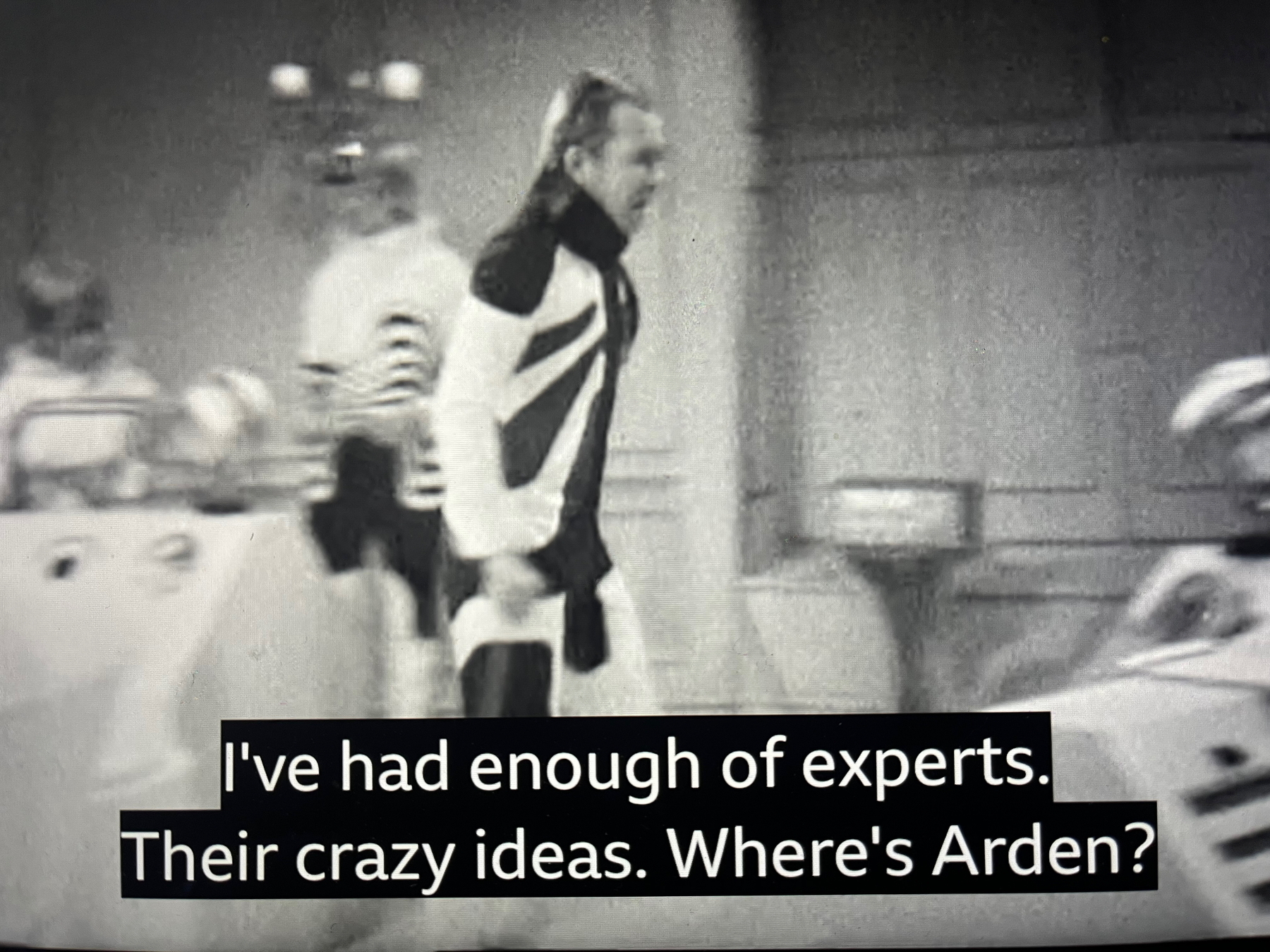
My slow-running run through of all surviving Doctor Who episodes has gotten to the Ice Warriors story.
OpenAI released their web search engine - at least to paid subscribers. Looks to be integrated into their standard ChatGPT experience.
They promise that it’ll provide citation links so you can see why it says what it says and perhaps even, you know, risk clicking your way outside of the chatbot experience and onto the provider of the information their robot gulped up.
RSS as a method of subscribing to your favourite online content is not dead, and thanks to its open nature no one can ever exactly take it away.
ALL-about-RSS is a big list of all sorts of RSS related information; everything from what even is it, through to which apps you might consider using as your reader, plus lots of handy RSS and RSS adjacent tools.
Possibly slightly less intimidating for the average interested user who already knows they want to get involved is a smaller list of RSS readers from openrss.org along with a tickbox summary of their respective features.
In Rough Justice, a Crown Court judge looks at how we treat crime committed by, or against, women
📚 Finished reading Rough Justice by Wendy Joseph.
This a sort of sequel to Joseph’s previous book, Unlawful Killings, which I read last year, although you could happily read them in either order.
It’s organised in a very similar way to her former offering. Wendy Joseph was a Crown Court judge. She takes us through a set of cases that are technically fictional but based on an amalgam of real trials, detailing what happens in the court room. So we get a mix of law-and-order but trueish-crime style stories along with information about court procedures and points of law that it behoves us to know about our justice system.
This time we have two themes that she focuses on via her selection of cases.
The first is the topic of justice itself. She notes that our approach to punishment has softened over time; no more do we legally disembowel, behead or hang perceived wrongdoers. But in terms of establishing the guilty/not guilty verdicts themselves, of bringing criminals to justice - whatever that means - she asks whether we’ve actually become all that more just over time or not.
On that, her conclusion is distressingly unsure. Some attempts at progress have certainly been made, but was it all that we could have done, and are they given adequate priority?
Some of the evidence for or against the proposition comes from comparisons of her modern-day cases with ones from the Old Bailey’s extensive archives which often have distinct parallels.
Her other focus is on cases involving women. Women commit less crime than men, and when they do so it tends to be more minor, less violent crime. There are of course exceptions. There’s more than enough to construct some interesting cases to consider. Lawyers, jurors and other court staff can also of course be women. Society of course has dynamics we should consider that make all of these roles more challenging than they are for the typical man. The author herself witnessed and was subject to plenty of sexual harassment.
The book starts off with a case involving a man accused of sexually abusing a young girl. The next is a young lady accused of murdering, dismembering and disposing of the remains of an older lady. Then a wife who kills her husband after years of abuse. And finally, a grandmother, who together with her son, is in the dock for harbouring a weapon that led to tragedy in the hands of her grandson
In several of these cases there’s not really much ambiguity as to whether at least part of the violent act was committed. But, even when we can figure out who did it, committing an act of violence isn’t the same as committing the criminal offence of violence.
Killing someone, for instance, has at least 6 potential defences one might consider.
- The alibi: It wasn’t me.
- Accident: I didn’t mean to do it.
- Lack of intent: I wanted to hit him but not intending to do great harm.
- Self-defence: I only hurt him to stop him hurting me.
- Diminished responsibility: My mental condition reduces my responsibility for what I did.
- Loss of control: He did or said something that would have made any reasonable person in my position snap.
Part of Joseph’s conclusion is that whilst reforming court practice is absolutely necessary and should be prioritised, there are places in the journey well before a case gets to the attention of a judge that must also be addressed.
We might ask why so much sexual violence, typically (but not always) committed against women of course, is not reported. And why so little of that which is reported is dropped before ever getting as far as to result a criminal charge, let alone a court case.
And even earlier in the process; it’s surely far preferable to stop a crime being committed in the first place than to have it considered after the fact by even the fairest of trials. Why then, in this case, do women commit crime? And why is crime committed against women? Is there anything in the understand of that could be used to prevent it in the first place?
The causes of crime are extensive and multifaceted - nature, nurture, lifestyle et al. But there are surely, for instance, social determinants of these matters, some of which society consistently fails to address.
Whilst the court system must be dramatically improved - which involves committing substantial resources to it - we can ease the burden on it and, far more importantly, the horrific impact of crime on people’s lives, by reducing the number of occasions where people feel compelled to commit crime in the first place.
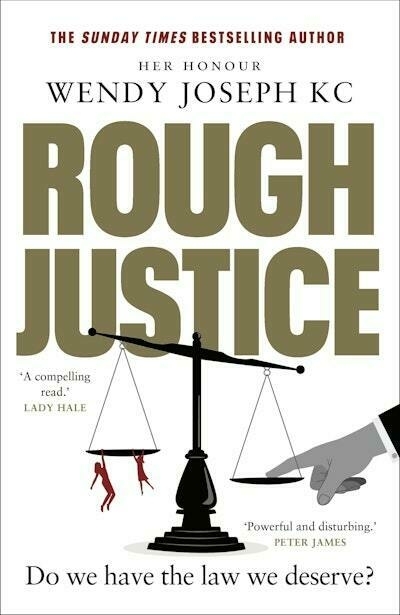
Daring Fireball collects the sycophantic well-done-Trump tweets sent by all those big tech CEOs we’re supposed to be in awe of in reaction to the recent election.
Man, they’re more repetitive than even journal papers authored by ChatGPT: ‘Congratulations, ‘decisive’, please don’t be mean to my gargantuan bank account.’
It’s like that time all the Tory MPs were told to post hard about how much Excellent Stuff Boris Johnson was very definitely Delivering at 8:29pm one Thursday night.
I wonder how much it stings to be reminded that all the money in the world cannot buy dignity,
Various breakdowns of voter support for Harris vs Trump from the BBC, in an effort to understand what on Earth happened.
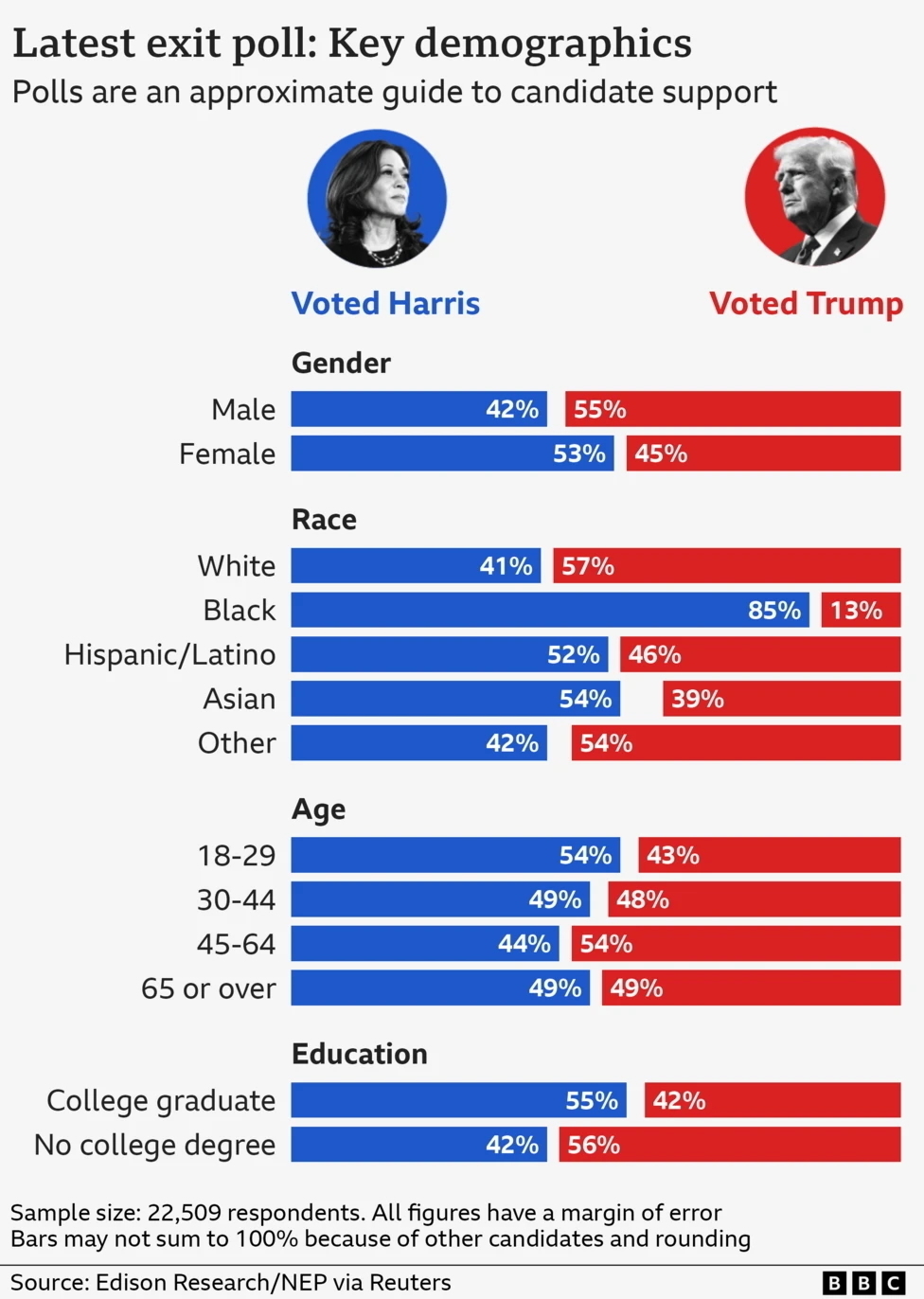
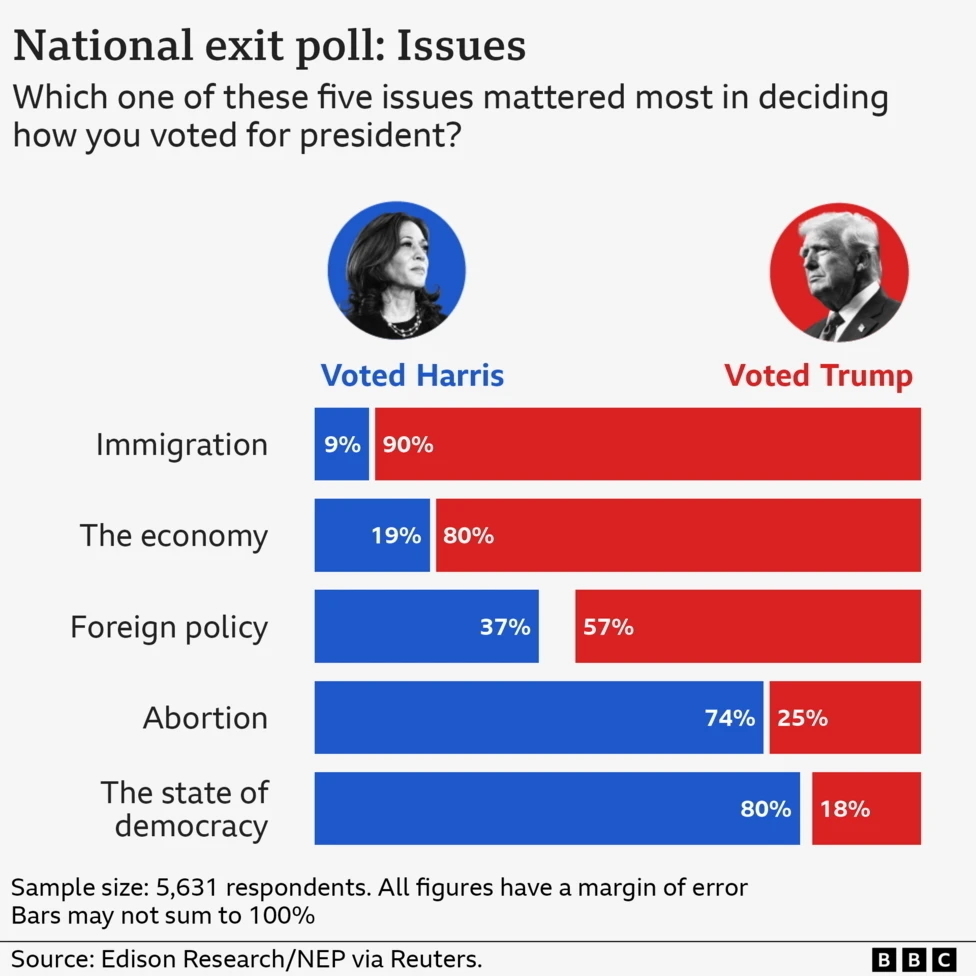
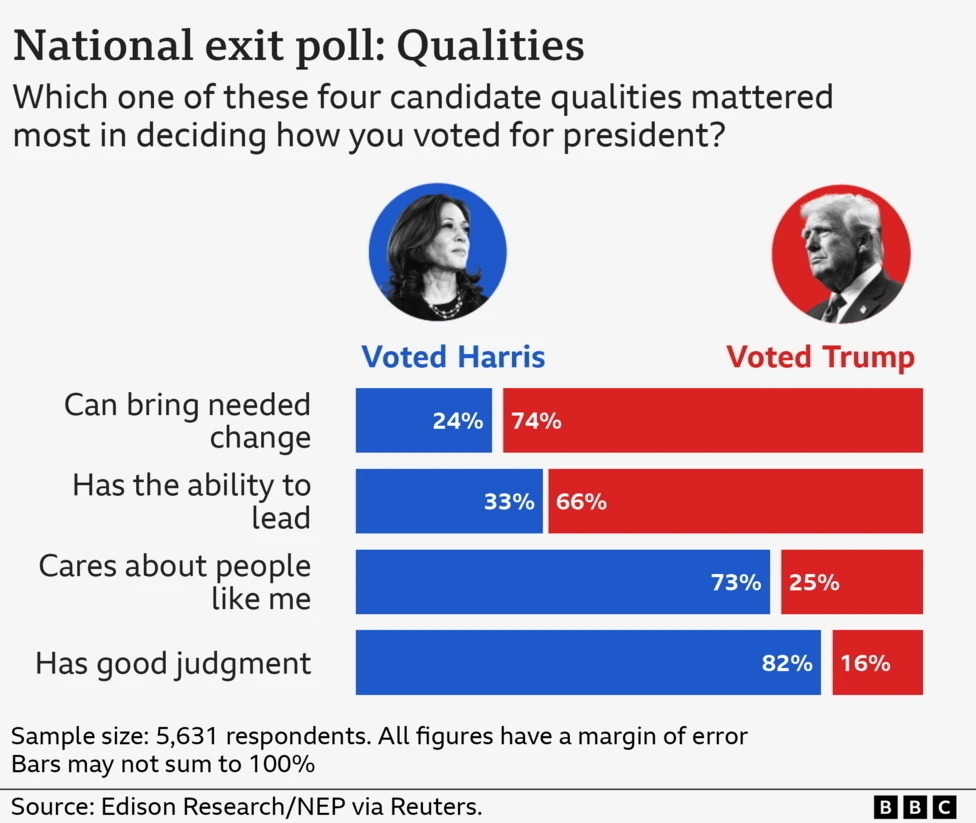
Trump won. By more than expected.
Sometimes fear triumphs over hope.
…
This time there is no excuse. America knew that he was a convicted criminal, serial liar and racist demagogue who four years ago attempted to overthrow the government. It voted for him anyway.
Democrats confront fact that Trump’s dark vision prevailed as result sinks in
Democratic and progressive Americans, at least 67 million of whom voted for Harris, struggled to come to terms with the overnight reality. They were confronted by the fact that Trump’s pitch to the American people, built on his dark and lie-packed vision of a country in terminal decline, “swamped” by murdering “illegal aliens”, and on the point of a communist takeover, had prevailed.
As does much of the rest of the world.
The world, too, will be reeling. It has long known the most powerful nation on earth committed war crimes from Vietnam to Iraq. Many will now take the view that has also committed a crime against decency and democracy itself.
Handy guide as to whether it’s safe to go to bed from The Guardian.
a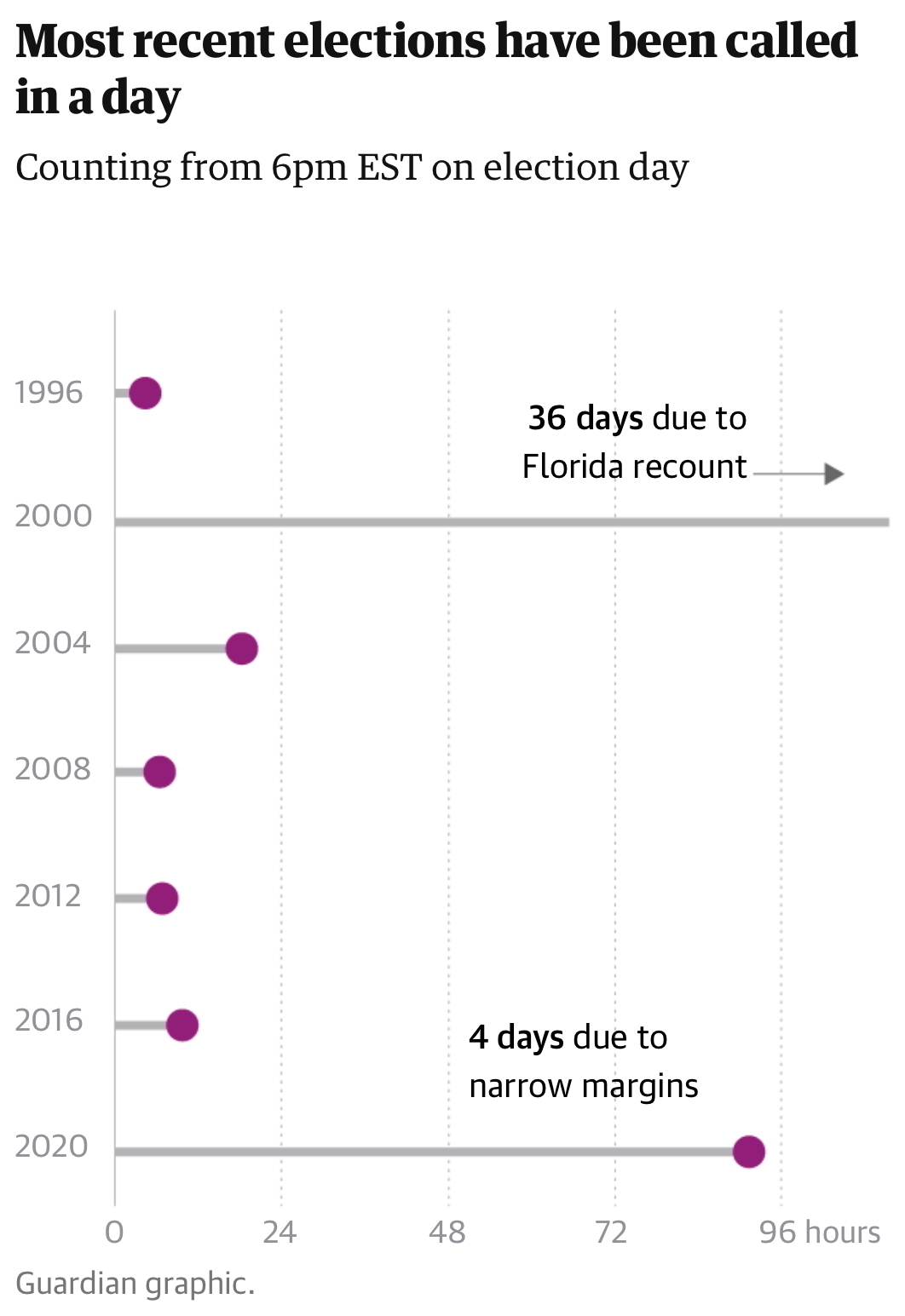
Some publications aren't afraid to endorse Harris, and do better for it
Unlike the enfeebled Washington Post and LA Times, the Guardian isn’t pulling many punches on its front page. Granted it isn’t under the same jurisdiction as the two aforementioned institutions, and it also isn’t owned by a a cowardly tech billionaire.
America’s moment of reckoning has arrived. On Tuesday, the nation will hold a presidential election like none before, poised between the historic candidacy of a Black woman and a former president branded a fascist by his own former officials.
Their formal endorsementcame a couple of weeks ago:
It is hard to imagine a worse candidate for the American presidency in 2024 than Donald J Trump. His history of dishonesty, hypocrisy and greed makes him wholly unfit for the office. A second Trump term would erode the rule of law, diminish America’s global standing and deepen racial and cultural divides. Even if he loses, Mr Trump has shown that he will undermine the election process, with allies spreading unfounded conspiracy theories to delegitimise the results.
…
Defeating Mr Trump protects democracy from oligarchy and dictatorship. There is too much at stake not to back Ms Harris for president.
A surprisingly (to me, perhaps it should not have been) good effort from a US based publication came from Teen Vogue’s Harris endorsement. They made the very valid point that even if you don’t like Harris' policies - specifically in their case the actions taken on the Israel/Gaza conflict - Trump would be so much worse on the same things, and furthermore make it hard to organise against it.
Donald Trump cannot win this election. Full stop.
Right now, we have the power to make sure that doesn’t happen.
…
Autocrats thrive on overwhelming people. President Trump overwhelmed us every single day.
…
It’s not enough to beat a fascist with razor-thin margins; ideally, we need to run up the margin of victory so high it becomes that much harder for Trump and his cronies to claim they represent the will of the American people.
…
Right now, we have the power to stop Trump. Should he win, we may not have these tools at our disposal again. Trump is on the record telling conservative Christians he just needs them to vote this year and then they won’t have to vote again. “Four more years, it’ll be fixed, it’ll be fine, you won’t have to vote anymore, my beautiful Christians,” he said this summer, one of many comments that should have set off a weeks-long scandalous news cycle but got subsumed by, well, everything else. He has an army of election deniers ready to do his corrupt, anti-democratic bidding.
In being censored by their owners from making an endorsement, the Washington Post and LA Times appear to have lost a lot of their subscribers. Semafor reports, in an article wonderfully titled “The Washington Post sold Democracy. Now it needs a new line of business” that the WaPo lost at least 200,000 of them - a cost thought to represent a possible $20 million in revenue. The LA Times lost at least 18,000, with both figures potentially still growing.
This, in their view is at least in part down to many subscribers to newspapers doing so as part of an effort to support “capital-J journalism” rather than merely improved access to a specific product’s content.
Hundreds of thousands of Americans didn’t necessarily feel they needed the Post’s journalism or its service products, but they did want Journalism with a capital J, a force willing to take Trump on directly and to absorb his wrath when other institutions weren’t.
That feels right to me. Whenever I have subscribed to a newspaper it wasn’t usually for the content. There’s more than enough information of interest floating around the internet “for free” - free if you disregard the payment taken via the secretive harvesting of your personal data at least.
It was because I supported the process and the people that created that content; supported the effort to go out there, do the no doubt often grueling work that stands some chance of informing us about reality, and critically, to expose and challenge the powerful when they lie to or otherwise abuse us.
Not that this should be the point, but endorsing Harris certainly didn’t cost the Guardian much in terms of subscriber or direct revenue. Rather it apparently let to a big increase in donations - around $2 million - making it, according to the Press Gazette:
…one of the most successful subscription marketing messages in the history of online news.
Cowardly tech billionaires further ruin their newspapers by letting Trump intimidate them into censoring the Opinions out of their Opinions section
As everyone on the internet noticed, all of a sudden last week the Washington Post newspaper decided that for the first time in a few decades they weren’t going to endorse a candidate for the presidential election.
This has not gone down well. It doesn’t help that the paper adopted the tagline “democracy dies in darkness” a few years ago. Cue statements such as:
So much for “Democracy Dies in Darkness”. This is the most hypocritical, chicken shit move from a publication that is supposed to hold people in power to account.
from Susan Rice, former US ambassador to the UN.
This is cowardice, a moment of darkness that will leave democracy as a casualty.
from Marty Baron, a former Washington Post executive editor.
The paper I’ve loved working at for 47 years is dying in darkness.
says David Maraniss, a reporter and editor at the Post.
Today has been an absolute stab in the back. What an insult to those of us who have literally put our careers and lives on the line, to call out threats to human rights and democracy.
says Karen Attiah, WaPo columnist.
The Post’s editorial board just won a Pulitzer Prize for calling out authoritarianism and defending democracy around the world…How sad is it that we can’t do that at home?
as an anonymous “senior Post staffer” told The Guardian.
A union with many WaPo employees in, the Washington Post Guild, expressed its deep concern at the decision.
What is particularly disgusting about the manoeuvre is the reason that it happened. It wasn’t that the editorial writers had nothing to say on the subject, that the reporters didn’t think they knew enough to have an opinion, or that it was decided sometime between 2020 and now that the Opinion section of a newspaper must never in fact contain any Opinion. In fact the Washington Post team had already written an endorsement for Kamala Harris. It had already been approved by the editorial page editor, David Shipley.
But then, the Washington Post owner - who is none other Jeff Bezos, who, most famously, founded and CEOd Amazon along with all the catastrophe that that particular enterprise unleashed upon the world - ordered them to pull it at the last minute. Ergo it was censored it out of existence, never to see the light of day, destined to die in darkness.
Yes, once again one of the weird tech billionaires is interfering with the standard practice of democracy, seemingly for nothing other than peculiarly selfish and small-minded reasons.
Platformer summarises the likely reasons as including basically being out of fear that if Bezos was even vaguely connected to something that might be read as criticising President Trump then Trump might take it out on him later if, heaven forefend, he became president. Which doesn’t seem like an unreasonable fear based on Trump’s previous behaviour. But, come on, we are talking about Amazon billionaire Jeffrey Bezos. I think he might just survive. He’ll be able to pay his bills (or, more likely, pay someone to pay someone to pay someone to avoid having to pay his bills).
Another possible reason might be payback to the current Democrat administration who have been overseeing a surprisingly strong - well, in a relative sense - pushback against some of the Big Tech monopolists, pursuing antitrust cases against a slew of companies including Bezos' own Amazon.
To be fair Bezos isn’t alone in this. His other weird tech billionaire pals are also cosying up to the disgraced ex-president, just in case.
Per Wired, Google CEO Sundar Pichai apparently called Trump so congratulate him on his bizarre “I work at McDonalds” stunt. Apple’s Tim Cook has also been on the blower plenty. Meta’s Zuckerberg called him up, presumably to congratulate him on being a “badass”, after the first assassination attempt, something that Bezos also did before the Washington Post incident.
The WaPo wasn’t the only newspaper to have its presidential endorsement story burned by its owner. It seemed to generate a bit less publicity, but eagle-eyed readers of the LA Times endorsement list last month might have noticed the distinct absence of a presidential endorsement. So in a way this is even weirder; they’ve no problem with the concept of political endorsements. There’s plenty on that list. They just decided to not publish one for the position that comes with the most impactful amount of political power going.
Well, I say “they”. Again the blocking of an endorsement wasn’t a “they” decision. The team had already decided that they were going to endorse Kamala Harris. It was a “he” decision.
Once again the article itself was blocked pre-publication, apparently the decision to censor was made by the paper’s owner - Dr Patrick Soon-Shiong.
In reaction to their article being blocked by the paper’s owner, the editorial editor Mariel Garza felt compelled to resign
“I am resigning because I want to make it clear that I am not OK with us being silent,” Garza said. “In dangerous times, honest people need to stand up. This is how I’m standing up.”
In a strong parallel to the WaPo’s equivalent, the LA Times Guild Unit Council & Bargaining Committee reported that it was:
…deeply concerned about our owner’s decision to block a planned endorsement in the presidential race.
In case Dr. Soon-Shiong’s sensibilities aren’t clear, he’s not a newspaper man by trade. Rather, he is - can you guess? - a (bio)tech billionaire who in the past has been seen “palling around” with Donald Trump, begging him for a job.
He may be the richest doctor in the world, but is nonetheless a man so delusional that following one such dinner with the president-at-the=time he publicly shared that it was an:
Incredible honor dining w/Pres-elect @realDonaldTrump last night. He truly wants to advance healthcare for all.
“For all”. Hmm.
That said, the New Yorker profile of the good doctor makes it clear that he does have certain lifestyle similarities to Trump. For example, they’ve both been repeatedly taken to court over various violations.
“He gets very enthusiastic, and sometimes he might exaggerate,” Hentz said. “He can embellish a little.” Outcomes for his diabetes treatment were disappointing, and one case ended tragically.
While pursuing this therapy, he also began researching chemotherapy. At the center of his fortune is a cancer treatment that costs more than a hundred times as much as another drug, available as a generic, that is prescribed for some of the same conditions.
Soon-Shiong has been repeatedly accused of financial misrepresentation, self-dealing, price gouging, and fraud. He has been sued by former investors and business partners; he has been sued by other doctors; he has been sued by his own brother, twice; he has been sued by Cher.
Let’s not even get started on Elon Musk - the richest master-performer of self-cringe that ever lived - who is now acting as Trump’s pet, literally (but awkwardly) jumping for joy, or whatever the Musk form of that emotion may be, on a public stage during his campaigning. As it happens, in between occurrences of this “I’m not just MAGA - I’m dark Maga” buffoon upwardly prostrating his body into some form akin to a broken X-shape for Likes, he’s also quite possibly breaking voter bribery laws.
These people - each of whom has more access to power and resources than any human should ever have, and have vastly benefited from so many aspects of the very systems of governance that Trump threatens to derail - are each presumably somewhere on the scale between MAGA-pilled ideologue true believers and selfish, spiteful, cowards.
Casey Newton sums it up well:
This is not, of course, a moral case for business leaders supporting Trump. There is no moral case for business leaders supporting Trump. Trump is an openly corrupt 78-year-old fascist, twice impeached and on 34 felony counts convicted, who attempted to stop the peaceful transfer of power in 2021 and now promises to further undermine the democracy of the United States if he manages to assume power again.
But a democratic emergency like the one we are now living through is not necessarily a business emergency. In the billionaires’ view, it could actually be an opportunity — to bring an end to the antitrust cases, to block further regulation of Big Tech in Congress, and to pursue their dreams of superintelligence in peace.
Admittedly this isn’t the most pressing issue of the forthcoming US presidential election, but all the excitement of seeing Donald Trump pretend to work in a McDonalds for a few minutes as part of a staged political stunt brings back to mind the previous revelation of his usual order when attending that institution as a customer (or sending someone to do so on his behalf).
As revealed by a couple of his former colleagues, his typical order would be 2 Big Macs, 2 Fillet-O-Fish and a chocolate milkshake.
What an…interesting combo. Grounds alone to accuse him of an incredible lack of judgement. It also represents substantially than his recommended calorie intake for a day consumed in one fell swoop: at least 2672, or more if it wasn’t a small shake.
It seems even being prosecuted in court didn’t sate his appetite, with reports of a “Massive stash of McDonalds’ being delivered to a court when he was there to defend one of the many legal cases against him.
Tampering with the polls for the US election
It seems that US Republican affiliated groups may have commissioned presidential election polls that are deliberately biased towards saying Trump will win.
This as a possible prelude to the horrific but plausible idea that if Trump loses then team MAGA will use ‘but the polls said Trump has the bigliest lead’ as (manufactured) evidence of some imaginary tranche of electoral fraud. They’d conclude of course that even though he got the least votes he should in any case be crowned the some-would-say-wannabe permanent king of what we previously referred to as the ‘free world’.
Elsewhere I heard suggestions that the actual legitimate pollsters were potentially underestimating Harris, deliberately or not, on the basis that failing - once again - to predict a Trump victory would be embarrassing.
Let’s hope then that the former story isn’t true - or at least isn’t effective in what the people concerned trying to accomplish - and the latter is.
The events leading up to the US election seem even more horrifying than usual
I’m wary of succumbing to my own biases by seeing the risks of the rise of the far right looming around every political event no matter how minor, but it’s hard to not to feel a certain amount of hopeless despair when it comes to forthcoming US election.
Perhaps I’ve overdosed on Timothy Synder’s excellent books, but when one sees things like the Madison Square Trump rally it’s hard not to hear several extremely loud metaphorical warning klaxons go off.
Trump vowed to win New York, saying it would be an “honor” to win his home state. But his remarks were overshadowed by the crude and offensive speakers that went before him, which included racist jokes about Puerto Ricans and Black people as well as prominent Democrats.
In the lead-up to Trump, comedian Tony Hinchcliffe, who goes by Kill Tony, referred to Puerto Rico as a “floating island of garbage,” made a crude joke about Hispanics and birth control, inferred that Jews are cheap and Palestinians are “rock-throwers” and made a racist comment about a Black man in the audience eating watermelon.>
…
Other warm-up acts called Hillary Clinton a “sick son of a b***”, another referred to Vice President Kamala Harris as the “antichrist” and a third said Harris “and her pimp handlers will destroy the country.” Former New York City Mayor Rudy Giuliani said Harris is “on the side of the terrorists.”
For all their many harmful, dangerous and deadly faults, it’s hard to imagine the UK Conservatives PRing themselves like that. It feels qualitatively different.
Next up, I suppose there’s no need to spend time lying about vote fraud when you can just burn the votes
A ballot box in Portland and another in Vancouver were set on fire, potentially disenfranchising the wise folk who had already voted early via depositing their ballot into one of them. I don’t think we know much about the what and why this happened yet, but it doesn’t seem exactly normal let alone good. If it makes any difference, the states concerned are (usually) safe Democratic seats.
Finally for now, continuing the habit that US MAGA-style Republicans have of saying the quiet bit out loud, we have ProPublica’s reporting about the previously private speeches of Trump’s “key ally” and previous director of the Office of Management and Budget, Russell Vough. He’s thought to be very likely to get a high-level governmental role should Trump get back into power.
A key ally to former President Donald Trump detailed plans to deploy the military in response to domestic unrest, defund the Environmental Protection Agency and put career civil servants “in trauma” in a series of previously unreported speeches that provide a sweeping vision for a second Trump term.
…
Other policies mentioned by Vought dovetail with Trump’s plans, such as embracing a wartime footing on the southern border and rolling back transgender rights…decrying the “transgender sewage that’s being pumped into our schools and institutions” and referring to gender-affirming care as “chemical castration.”
…
“We want the bureaucrats to be traumatically affected,” he said. “When they wake up in the morning, we want them to not want to go to work because they are increasingly viewed as the villains. We want their funding to be shut down so that the EPA can’t do all of the rules against our energy industry because they have no bandwidth financially to do so.
“We want to put them in trauma.”
Cruelty as praxis, once again.
Vox's take on "Is AI the new nuclear weapons?"
Last year, Vox laid out their view as to how true or useful the “artificial intelligence is the new nuclear weapons” analogy actually is. The high-level summary of their take is:
Similarities:
- The scientific progress on the technology has been very rapid.
- There is potential for mass harm, even if the mechanism is generally less obvious in the case of AI.
- Both require materials - uranium for nukes, certain types of microchips for AI - that are relatively scare and potentially trackable.
- They have dynamics of an arms race.
Differences:
- Nuclear weapons are a wholly military technology, AI is a general-purpose one.
- It’s much easier to copy someone’s AI than their nuclear bomb.
Their takeaway is that the general “AI is like a nuclear weapon” analogy is usually quite parallel enough to prove useful, but that certain specific processes involved are similar. And in any case, in general:
The best way to handle a new, powerful, dangerous technology is through broad international cooperation. The right approach isn’t to lie back and just let scientists and engineers transform our world without outside input.
'Oppenheimer' tells the story of the man behind the world's first nuclear bomb, and his later regrets
🎥 Watched Oppenheimer.
This is the story of J. Robert Oppenheimer, the scientist who led the Los Alamos Laboratory, assigned in 1942 to the task of developing the world’s first nuclear weapon. Whilst he appeared to some reservations from the start, the race was on given his fear that the German Nazis might beat them to it which might then lead them to victory during the ongoing Second World War.
The nuclear bomb Oppenheimer et al. developed of course worked, even if whilst during testing the effects of atomic detonation they weren’t absolutely certain that it wouldn’t cause the literal end of the world. So quite a high-stakes workplace, at least compared to the average day of work in my job.
I’m sure some people might see modern-day parallels with the unconstrained development of AI, even if the mechanisms towards destruction are a lot less straightforward.
After the nuclear bomb was used against Japan in 1945 - in Hiroshima and Nagasaki - Oppenheimer became an advisor to the Atomic Energy Commission.
He became ridden with guilt about the sheer amount of destruction and huge loss of life that his life’s work to date had led to. His ethical concerns led him to argue for global control of nuclear power to avoid nuclear proliferation, particularly the risk of an escalation of the technology during the Cold War with the Soviet Union. This led him to opposing the development of the H-bomb, contrary to the President’s wishes.
This, along with his past associations with the Communist Party, meant that he was subject to accusations of disloyalty. He ended up in front of a private security hearing, after which his security clearance was revoked.
The film is three hours long, but it’s a big story to tell, and an important one. It very much captured my interest throughout, even if my ability to find such a lengthy continuous timespan of focus given the constraints of modern life is such that I ended up have to watch it over two sittings.


Tell me how you measure me and I will tell you how I will behave. If you measure me in an illogical way don’t complain about illogical behaviour.
Eliyahu M. Goldratt, from The Haystack Syndrome.
The New York Times advises us to believe Trump when he tells us what he's going to do
We’re not far away from the next US presidential election, which is to be held this November 5th. Either Harris or Trump are destined to walk away the victor, with the polls being scarily ambiguous on which it will be. It’s a fairly scary time, even for those of us outside of the US.
Whilst campaigning, Trump often makes a series of claims about what he will do that at a glance seem too ludicrous or cruel to be true.
In the past it’s often been suggested, especially by some of his high profile supporters, that we should take Trump seriously but not literally, to take him symbolically, not literally. But The New York Times implores us to take him at his word; to believe him when he tells us what he wants to do.
Donald Trump has described at length the dangerous and disturbing actions he says he will take if he wins the presidency.
…
These statements are so outrageous and outlandish, so openly in conflict with the norms and values of American democracy that many find them hard to regard as anything but empty bluster.
We have two words for American voters: Believe him.
The article goes through the what he says and why you should believe him using the following categories.
Trump says he will:
- use the Justice Department to punish people he doesn’t like.
- will round up and deport millions of immigrants.
- deploy the American military against U.S. citizens.
- allow vigilante violence to end crime.
- order the military to strike foreign civilian targets if the United States is attacked.
- punish blue states by withholding disaster relief.
- use ideological tests to decide which public schools get federal money.
- abandon U.S. allies.
The Pudding visualises the process of getting an abortion as a maze
The Pudding visualises the often laborious and damaging path some who needs an abortion needs to take if situated in the US as a series of mazes.
Even whilst. Roe vs Wade was in force the process was often full of “twists, turns and roadblocks”. But now, since its overturning in 2022, states have the power to take away someone’s right to an abortion, even to ban abortion entirely. 13 did exactly that. Some other states made access harder, and a few put new legislation in place to protect this important right.
Whilst interacting with The Pudding’s visualisation you find yourself following a story of an individual, based on a real-life case, who is seeking such a service whilst trying to make your way through a literal maze of a complexity related to the real life difficulty of obtaining this important medical care - whether this be, for instance, California’s relatively simple process or Tennessee’s fiendishly complicated effort.
In no case are the individual’s stories entirely uncomplicated. A maze is still a maze. But this very effectively, and very creatively, highlights the huge variation in the access our US friends have to this type of healthcare.
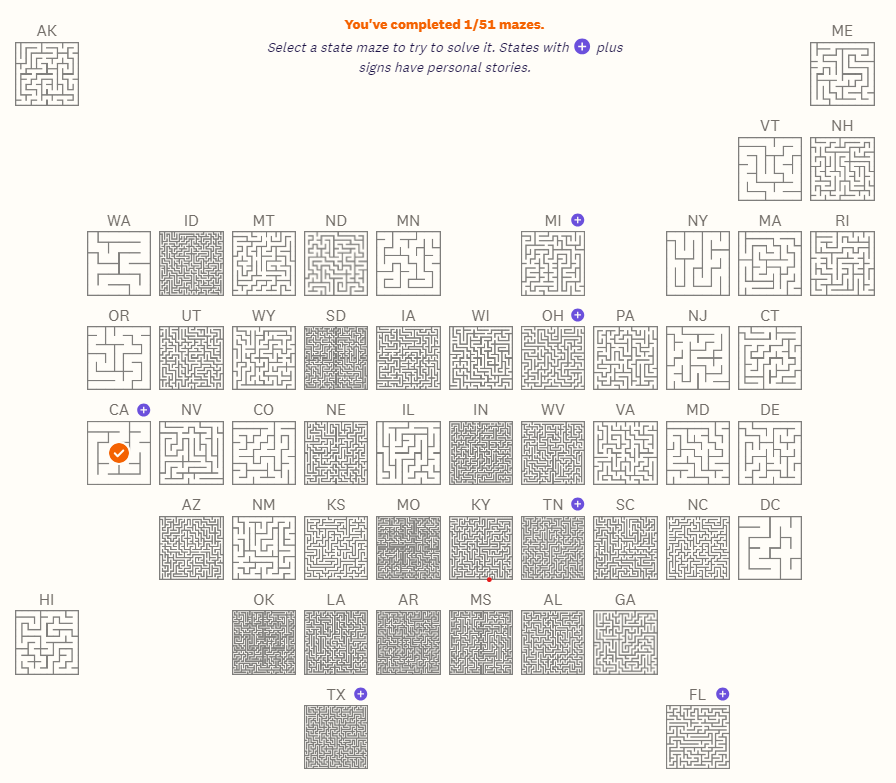
Two types of information overload: the situational vs the ambient
I have an information problem. There are 278 books on my “Want to read list”. There are 1,794 articles saved in my read-later app. There appear to be 2,241 episodes in my podcasts “to listen to” queue. The knowledge of hundreds of pending unread journal articles put me off ever even opening my collection of them to check.
Then on the other side of the equation there’s the collection of hundred of read items I want to blog about, and several half-written posts about a fraction of them.
I’m somewhat ashamed to say I even started a new RSS reader account on the basis that my collection of feeds felt somewhat unmanageable when all in one place. I guess I’m going to have to stop teasing my colleague for starting a new Google mail account because their previous one filled up.
It’s absurd. I’ve only got one lifetime, as far as I know. And it’s not like these numbers don’t grow every single day.
I know I’m not alone in this. Nicholas Carr writes about two forms of information overload, only one of which is solvable by the standard solution of improving the information filters, search and prioritisation algorithms that are available to us.
One can intuitively feel this to be true. We have so many more electronic facilities to aid us in sorting through and finding high quality material than we used to - even whilst acknowledging that some of the more famous ones are perhaps getting worse. But who feels like they have less information overload now than in the past?
In Carr’s view, that’s because these filtering systems only solve “situational overload”
Situational overload is the needle-in-the-haystack problem: You need a particular piece of information — in order to answer a question of one sort or another — and that piece of information is buried in a bunch of other pieces of information.
Many information-sorting technologies, from the introduction of indexes, catalogues and the Dewey Decimal system onwards, have made inroads into this.
But these systems don’t help with “ambient overload”.
Ambient overload doesn’t involve needles in haystacks. It involves haystack-sized piles of needles.
We experience ambient overload when we’re surrounded by so much information that is of immediate interest to us that we feel overwhelmed by the neverending pressure of trying to keep up with it all.
This is exactly right. I’m not confused as to which handful of my 278 to-read books are actually going to be of interest to me. In principle they all are. I hand-selected them. This is a post-filtered list, full of likely needles; full of signal, not obscured by noise.
The world’s best search isn’t going to help me here. In fact, improving the filters we have available to us simply pushes ever-increasing amounts of ever-more interesting content in our direction.
There are people trying to solve this problem, but no solution that I’ve seen feels very satisfying. For example, there are multiple book summarisation services - Blinkist, Shortform and their ilk - which I’ve played with a bit in the past. Whilst they have their uses I don’t find them to be an adequate substitute for the original material. Let alone the modern AI based solutions - either the generic “Please, chatbot, summarise this book in 2 paragraphs” options or the dedicated “summarisation services”. Many people naturally have ethical concerns about the type of AI they typically use, alongside the ever-present risk that they in fact fail to summarise the content correctly.
If however we determine that these services do have a legitimate place, then again I feel like - at least for me - they’re addressing situational overload. I’d be using them as filters for “do I want to read the whole thing?” rather than as a substitute for “I have read the whole thing”.
Of course, if you’ve a need to get the basic gist of a book very quickly but have no desire to spend substantial time working through it then those services might potentially work well for that - I haven’t checked the efficacy studies! - but that lack of desire isn’t the problem I face.
So what is the solution? Carr doesn’t really present one. Perhaps there are none, other than somehow reconciling oneself to be able to happily live whilst giving up on the idea that we could possibly indulge in even a sizeable fraction of the things we’re interested in within this new(ish) world of information abundance. Or, as Keenan writes, accepting that “It’s okay if we don’t consume all of the world’s information before we die”.
Currently trying out a combo of FreshRSS and NetNewsWire to experience the joy (?) of aggregating, managing and perusing RSS feeds without relying on someone else’s cloud service.
FreshRSS is “A free, self-hostable feed aggregator”. Think Feedly, Google Reader (RIP) et al. but self-hostable, open source, private (if you want it to be) and subscription-free. You can access it via the web, desktop or mobile. Here’s a screenshot from their site.
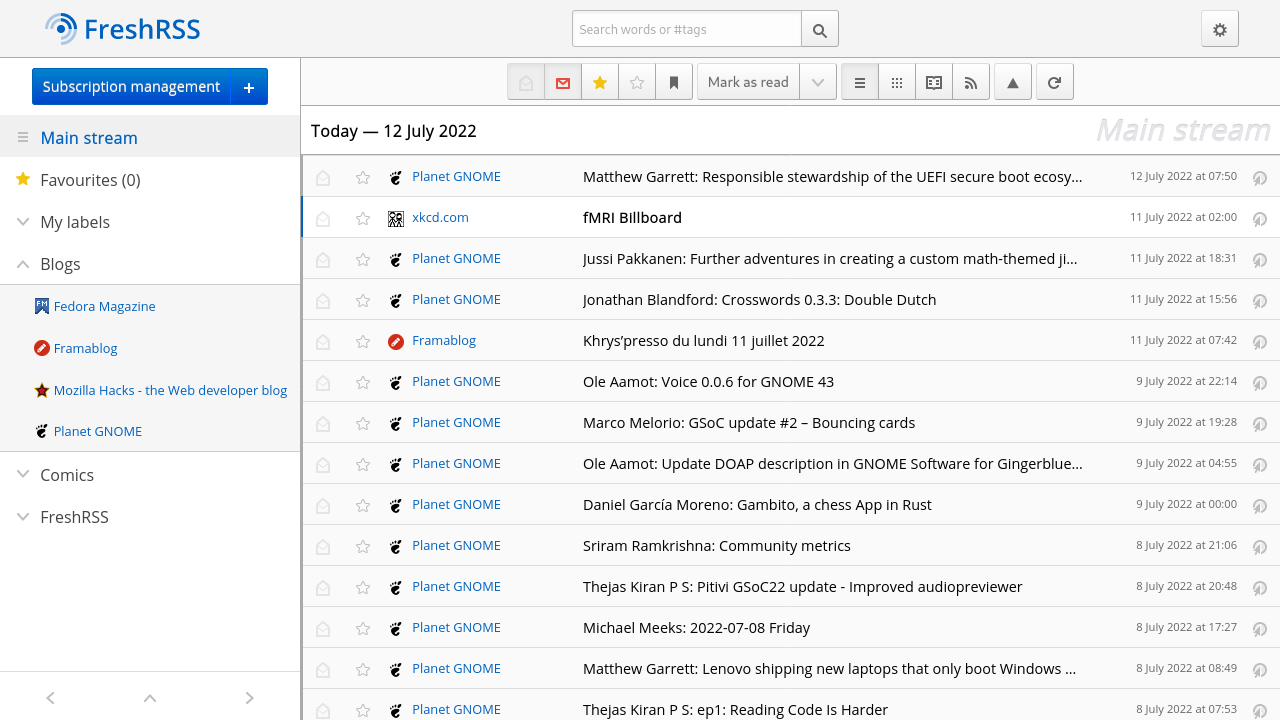
NetNewsWire is one of many client RSS apps that are out there that can sync with FreshRSS if you prefer reading your feeds in an app. This one has the selling point being both free, open source and, again, not infused with features to sell your brain to the highest bidder.

There are of course several similar options if those two don’t float your boat.